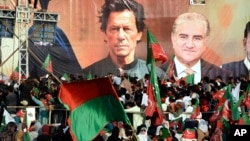Thousands of supporters of Pakistan's imprisoned former prime minister, Imran Khan, rallied on the outskirts of Islamabad Sunday to denounce his “illegal” incarceration and demand his immediate release.
Khan's Pakistan Tehreek-e-Insaf, or PTI, party organized the public gathering, one of the largest in the Pakistani capital's history.
The strong turnout came despite the police blocking the officially designated route for rally participants with shipping containers in an apparent bid to restrict convoys from other cities from reaching the venue. The administration also deployed riot police to prevent possible unrest.
Social media videos and images showed PTI workers and leaders from elsewhere in Pakistan marching toward Islamabad. PTI activists were seen successfully removing containers to clear the way at several entry points.
Police briefly clashed with and fired tear gas shells on PTI workers en route to the rally. Authorities later reported injuries to several police personnel due to stone pelting allegedly from Khan supporters, charges party leaders rejected.
“We will continue our efforts until Khan is freed from prison,” Hammad Azhar, a central PTI leader, told the rally.
Critics observed that Sunday’s rally demonstrated once again that the 71-year-old former cricket star-turned-prime minister remains Pakistan’s most popular politician despite facing a series of state-backed criminal prosecutions and lawsuits.
“Strong turnout for PTI rally despite the state's tactics to limit numbers through roadblocks and containers, and despite the risk of violent crackdowns and arrests,” Michael Kugelman, the director of the South Asia Institute at Washington’s Wilson Center, said on X.
“Its size and popularity ensure its mobilization capabilities remain intact despite relentless attempts to curb it," Kugelman wrote.
Khan completed 400 days in prison on Sunday. The charges against him range from corruption to sedition to stoking violent anti-army protests. He rejects all the allegations as politically motivated and asserts that the powerful Pakistani military is behind them to block his return to power.
Subsequently, appeals courts have overturned or suspended all his convictions for lack of evidence, but authorities quickly launched new charges to prevent him from leaving prison. The United Nations in July declared Khan’s detention arbitrary, saying there was no legal basis for keeping him in prison.
Mushahid Hussain, who recently retired from Pakistan’s Senate, the upper house of parliament, criticized Prime Minister Shehbaz Sharif’s government for “barricading Islamabad” through containers and coercion and for creating an “atmosphere of fear & force” in its attempt to block Sunday’s political rally.
Hussain warned through a post on X that such efforts would impede political stability and economic recovery. “’Common Sense’ can be quite Uncommon!” he wrote.
Sunday’s rally by the PTI in Islamabad was its first since parliamentary elections on February 8. Khan’s convictions at the time barred him from running, but his party candidates emerged winners of most seats in the National Assembly, the lower house of parliament, but not enough to form the government.
The PTI alleged the vote was massively rigged to prevent its candidates from sweeping the polls. This allowed military-backed rival political parties to form a coalition administration with Sharif as prime minister.
Hundreds of PTI workers and leaders, including women, have been jailed or under trial on charges defense attorneys reject as baseless and part of the state crackdown on the party.
Khan served as Pakistan’s prime minister from 2018 until April 2022, when he was ousted through an opposition parliamentary no-confidence vote he alleges was planned by the military. Successive Pakistani governments and military officials have denied the allegations.
Last month, his party announced that Khan had formally applied to run for chancellor of the University of Oxford in Britain from his prison cell. The election university website states that the new chancellor will be elected through an unprecedented online ballot process beginning on October 28.
Khan, an Oxford graduate, served as the chancellor of University of Bradford from 2005 to 2014.





